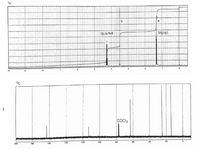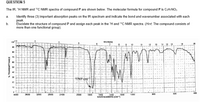
Chemistry
10th Edition
ISBN: 9781305957404
Author: Steven S. Zumdahl, Susan A. Zumdahl, Donald J. DeCoste
Publisher: Cengage Learning
expand_more
expand_more
format_list_bulleted
Concept explainers
Question

Transcribed Image Text:'H
a
quartet
| triplet
|
CDCI3
140
120
100
200
180
160

Transcribed Image Text:QUESTION 5
The IR, 'H NMR and 1°C NMR spectra of compound P are shown below. The molecular formula for compound P is CsH;NO2.
Identify three (3) important absorption peaks on the IR spectrum and indicate the bond and wavenumber associated with each
peak.
Elucidate the structure of compound P and assign each peak in the 'H and 1°C NMR spectra. (Hint. The compound consists of
more than one functional group).
а.
b.
MICRONS
13
14 15 16
DO
50
40
30
1747
10
800
600
400
4000
3600
3200
2800
2400
2000
1800
1000
1400
WAVENUMBERS (CM-)
1600
1200
% TRANSMITTANCE
Expert Solution
This question has been solved!
Explore an expertly crafted, step-by-step solution for a thorough understanding of key concepts.
This is a popular solution
Trending nowThis is a popular solution!
Step by stepSolved in 4 steps with 3 images

Knowledge Booster
Learn more about
Need a deep-dive on the concept behind this application? Look no further. Learn more about this topic, chemistry and related others by exploring similar questions and additional content below.Similar questions
- A compound with the molecular formula C4H₁1N has the following ¹H NMR spectrum, in which the relative integration values are illustrated with step curves. Which of the following is the correct number of protons giving rise to each signal? al O2H, 3H, 6H Ο 1Η, 4Η, 6Η O 2H, 4H, 5H O 3H, 4H, 5H PPMarrow_forwardHow many signals would you expect to see in the 1H NMR spectrum of each of the five compounds with molecular formula C6H14?arrow_forwardBelow is the ¹H NMR spectrum of a constitutional (structural) isomer of C9H100, with the integration given above each peak. In addition to other peaks not given here, the IR spectrum of the isomer showed a strong peak at 1700 cm-1 Determine which of the structures given below the spectrum matches the 1H NMR spectrum. H3C 5 A C CH3 CH3 HO B D PPM CH3 CH ₂ 2 FM N 3arrow_forward
- 1. 1H-NMR spectrum of 1,3-propanediol (HO-CH2-CH2-CH2-OH) shows a quintet at 1.81 ppm, a singlet at 2.75 pm, and a triplet at 3.83 ppm. Assign each signal to the protons it corresponds to in the molecule. Explain the splitting pattern observed for each signal.arrow_forwardI need help with analyzing thisarrow_forwardWhich of the following compounds (methylene blue, methyl orange, methyl red, or carotene) does the spectrum belong to?arrow_forward
- 1. How many proton signals would you expect to see in the ¹H-NMR spectrum of the following molecule? For each of the proton signals, predict the splitting pattern, assuming that you can see only 3-bond splitting.arrow_forwardDetermine the compound (name or structure) from the data. Explain features from each data. Molecular formula: C6H5Br Use molecular formula to determine IHD IR: Identify the presence/absence of five key functional groups NMR: Analyze this last. Consider multiplicity and peak area to confirm compound. The 5 H peak area covers both peaks (at 7.1 and 7.5 ppm Structure?arrow_forwardWhich of these choices best describes the interpretation of the following peak that may be recorded in a 'H NMR spectrum? 2.5 8 (2H, d). The underlined hydrogen atom is intended to be the one producing the peak that we are interpreting. O=C-CH,CO2H O=C-CH2CHX2 O=C-CH2CH2X O=C-CH2CH3 None of these interpretations describes this peak.arrow_forward
arrow_back_ios
arrow_forward_ios
Recommended textbooks for you
 ChemistryChemistryISBN:9781305957404Author:Steven S. Zumdahl, Susan A. Zumdahl, Donald J. DeCostePublisher:Cengage Learning
ChemistryChemistryISBN:9781305957404Author:Steven S. Zumdahl, Susan A. Zumdahl, Donald J. DeCostePublisher:Cengage Learning ChemistryChemistryISBN:9781259911156Author:Raymond Chang Dr., Jason Overby ProfessorPublisher:McGraw-Hill Education
ChemistryChemistryISBN:9781259911156Author:Raymond Chang Dr., Jason Overby ProfessorPublisher:McGraw-Hill Education Principles of Instrumental AnalysisChemistryISBN:9781305577213Author:Douglas A. Skoog, F. James Holler, Stanley R. CrouchPublisher:Cengage Learning
Principles of Instrumental AnalysisChemistryISBN:9781305577213Author:Douglas A. Skoog, F. James Holler, Stanley R. CrouchPublisher:Cengage Learning Organic ChemistryChemistryISBN:9780078021558Author:Janice Gorzynski Smith Dr.Publisher:McGraw-Hill Education
Organic ChemistryChemistryISBN:9780078021558Author:Janice Gorzynski Smith Dr.Publisher:McGraw-Hill Education Chemistry: Principles and ReactionsChemistryISBN:9781305079373Author:William L. Masterton, Cecile N. HurleyPublisher:Cengage Learning
Chemistry: Principles and ReactionsChemistryISBN:9781305079373Author:William L. Masterton, Cecile N. HurleyPublisher:Cengage Learning Elementary Principles of Chemical Processes, Bind...ChemistryISBN:9781118431221Author:Richard M. Felder, Ronald W. Rousseau, Lisa G. BullardPublisher:WILEY
Elementary Principles of Chemical Processes, Bind...ChemistryISBN:9781118431221Author:Richard M. Felder, Ronald W. Rousseau, Lisa G. BullardPublisher:WILEY

Chemistry
Chemistry
ISBN:9781305957404
Author:Steven S. Zumdahl, Susan A. Zumdahl, Donald J. DeCoste
Publisher:Cengage Learning

Chemistry
Chemistry
ISBN:9781259911156
Author:Raymond Chang Dr., Jason Overby Professor
Publisher:McGraw-Hill Education

Principles of Instrumental Analysis
Chemistry
ISBN:9781305577213
Author:Douglas A. Skoog, F. James Holler, Stanley R. Crouch
Publisher:Cengage Learning

Organic Chemistry
Chemistry
ISBN:9780078021558
Author:Janice Gorzynski Smith Dr.
Publisher:McGraw-Hill Education

Chemistry: Principles and Reactions
Chemistry
ISBN:9781305079373
Author:William L. Masterton, Cecile N. Hurley
Publisher:Cengage Learning

Elementary Principles of Chemical Processes, Bind...
Chemistry
ISBN:9781118431221
Author:Richard M. Felder, Ronald W. Rousseau, Lisa G. Bullard
Publisher:WILEY